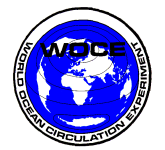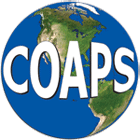



True winds (defined herein as a wind with a direction referenced to
true north and a speed referenced to the fixed earth) are essential for
oceanographic and atmospheric research over the ocean. Through analysis
of automated wind data collected by WOCE research vessels, the analysts
at WOCE-MET determined that large errors were common in true wind
calculations. These errors were found to be the result of 1) confusion
in the definition of true wind and the variables needed to calculate
the true wind, 2) incorrect installation or recording of wind
parameters, and 3) missing or incorrect navigation data. On this page
we provide both documentation of the problems that occur in true wind
computation (primarily with automated systems) and program source codes
for computation of true winds using meteorological definitions. The
meteorological true wind is defined as the generic true wind above with
the wind direction being FROM which the wind is blowing. This is
opposite the wind direction commonly recorded by oceanongraphers and
different from the second Merchant Marine true wind direction, which is
referenced to the ship's bow (See Table
1).
For details on the confusion in definitions and the problems found in
wind and navigation measurements, please read "Establishing
more truth in true winds". This article has been published in the Journal of Atmospheric and Oceanic Technology and contains information
on:
| Causes for inaccuracy | Section 2 |
| Vector calculation of true winds | Section 3 |
| Common problems found in true winds during WOCE-MET Quality control |
Section 4 |
| Estimating true winds from incomplete data sets | Section 5 |
| Summary and recommendations | Section 6 |
| Detailed mathematics for automated calculation of true winds |
Appendix A |
| Conversions between meteorological, oceanographic, and Merchant Marine conventions |
Appendix B |
The calculations presented in Appendix A are the basis to a set of
program codes available for calculating true winds (meteorological)
from underway and on-station vessels. We provide the necessary
subroutines and a test program in three common languages: FORTAN, C,
and IDL (an Interactive Data Language). These programs have all been
tested under the Silicon Graphics operating system. WOCE-MET believe
the codes will be portable to other platforms, but no tests have been
run. If you experience any problems using these codes, contact us at wocemet@coaps.fsu.edu.
| C-Codes | FORTRAN Codes | IDL Codes |
Any questions regarding the any of the above information should be sent
to:
wocemet@coaps.fsu.edu.